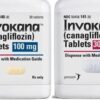The FDA has ordered that manufacturers of transvaginal mesh products, the most common item used in pelvic organ prolapse (POP) repair, stop selling them. The agency’s move comes amid growing concern about their safety. Just two companies, Boston Scientific and Coloplast, make transvaginal mesh for POP repair. In 2016, transvaginal mesh was reclassified as a Class III device, meaning that there is high risk associated with the product. At the time, the FDA also ordered the two companies to submit applications showing that transvaginal mesh worked better than surgery without mesh for POP repair. The agency says that the companies did not do so and “have not demonstrated a reasonable assurance of safety and effectiveness.” Posted April 16, 2019. Via FDA.
The FDA has approved Plenity, a new prescription drug for weight loss. Plenity (Gelesis100) is considered a hydrogel therapeutic and is taken as a capsule twice a day before lunch and dinner, along with a diet and exercise program. After ingestion, the drug works by releasing thousands of tiny particles in the stomach that absorb water, creating small gel pieces with the firmness of plant-based foods but without the calories. The pieces increase the volume of contents in the stomach and small intestine, leading to a feeling of fullness. The most common side effects seen in Plenity studies were gastrointestinal in nature. It should also be avoided by pregnant women and those with esophageal abnormalities or with issues from gastrointestinal tract surgeries. Gelesis, which manufactures Plenity, says the product will have a targeted release in the second half of the year, with widespread availability next year. Posted April 16, 2019. Via Gelesis.
People who regularly use marijuana may need more sedatives and anesthesia before surgery as a result. Researchers analyzed the medical records of 250 people who underwent an endoscopy or colonoscopy. Twenty-five people said they smoked marijuana or consumed edible cannabis products on a daily or weekly basis. On average, those who used cannabis required 220% more propofol, 20% more midazolam and 14% more fentanyl before the procedure. Researchers noted that this is concerning, since higher doses of sedatives and anesthesia increase the risks for side effects. Posted April 15, 2019. Via Journal of the American Osteopathic Association.






